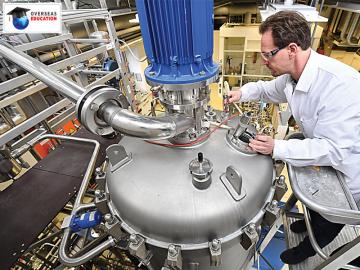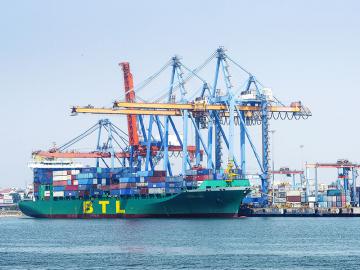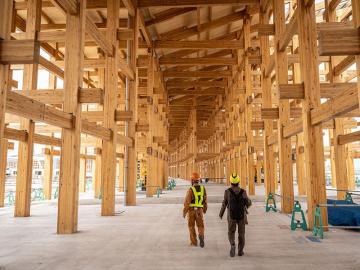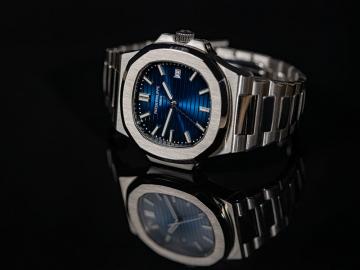
Bangkok's riverboat queens
Starting a century ago, four generations of women have run a company that ferries people across the Chao Phraya. Now the property business is calling
 Two of four generations of the family business: Supapan with daughter Natapree (Pim)
Two of four generations of the family business: Supapan with daughter Natapree (Pim) Image: Adam Dean for Forbes
Supapan Pichaironarong-songkram is explaining the art of managing the tough men who operate her 90-strong fleet of ferries, commuter boats and charters that ply Bangkok’s Chao Phraya River. “When you work with men, you don’t work as a woman and a man. A man will always look down on a woman. They probably don’t think I know much. I go to them as a friend or mother. I protect them. If they know that, they will trust me. They know they will never lose a job.”
Supapan, 73, represents the third generation of women at the helm of Supatra & Chao Phraya Express Boat Group. Her grandmother started the ferry service roughly a century ago—the exact year is unknown—and when she died in 1931, Supapan’s mother took over at the age of 20. Today the group comprises ten companies and 600 employees, and the fourth generation is getting ready to take over. Supapan’s 32-year-old daughter, Natapree, better known as Pim, has been building the group’s advertising sales, hotel and real estate businesses for the past six years.
Supapan is petite, soft-spoken and impeccably groomed. If she hadn’t felt a sense of responsibility to carry on the family business, she would have followed a more genteel line of work, perhaps using her French degree or pursuing a career as a pianist. But, says Pim, her only child, her mother’s benign appearance is deceptive: “She works six days a week. She doesn’t have an engineering degree, but she knows all the specifications of the boats, the materials, the buoyancy required for the boats to float, the width of the river, the depth of the river. She will act like she doesn’t know much, but she knows everything. You cannot mess with her.” Until his death in 2007, Supapan’s architect husband, Pao Pichaironarongsongkram, also worked in the company’s management, but the women were always the bosses.
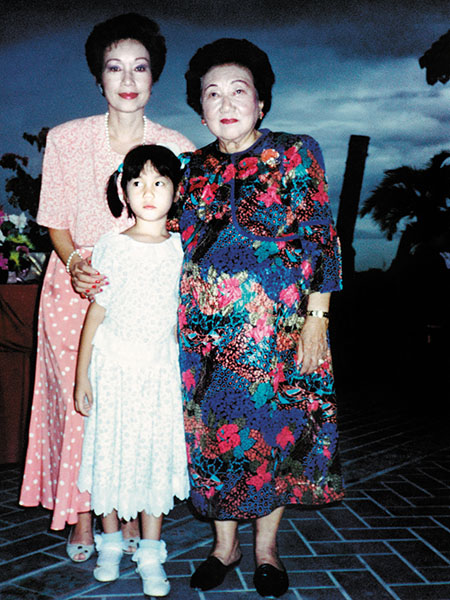
The privately held group generates $30 million in revenue a year, but that figure is expected to soar over the next decade for two reasons: Supapan plans to replace her entire open-air wooden express fleet with sleek, high-speed, air-conditioned aluminum boats, perhaps catamarans that will skim above the water. And Pim is drawing up plans for the group’s $300 million in property, much of it undeveloped. The 57 Chao Phraya Express boats account for one third of the revenue. They run like public buses for 13 miles up and down the river, hauling more than 100,000 passengers a month. Their share of the group’s receipts might shrink as the real estate business grows, but both mother and daughter say boats will always be their core business. “When you see the Supatra brand, you know it must be by the water,” says Supapan.
Even in a region known for its family-owned companies controlled by successive generations, the Pichaironarongsongkrams may be unique. More daughters are taking over companies from their fathers throughout Asia. But a daughter taking over from her mother is rare, and a fourth generation of daughters assuming the reins is unheard of. Overall, only around 3 percent of new businesses worldwide will stay in the family and in the same business for three generations, studies have found.
Fortuitously, Supapan’s formidable mother, Supatra Singholaka, enjoyed an unusual pastime when she wasn’t building her boat company. “She loved buying land,” recalls Supapan. There are plots all over Thailand waiting to be developed, from Bangkok to the coast to northern Chiang Rai Province. Pim launched Supatra Real Estate Co in 2015, and the offshoot has already opened two riverside hotels and two mini-malls.
Pim had ideal preparation for the work. In 2004, after high school at Switzerland’s Institut Le Rosey, she headed to Cornell University’s School of Hotel Administration. Her mother had recently opened two riverside restaurants and a resort hotel in the coastal town of Hua Hin, fulfilling an early interest in hospitality, and Pim wanted to build and own more hotels. But studying at Cornell widened her horizons. “I wanted to build more than hotels. I wanted to be in the real estate sector, to build perhaps condos, apartment houses, maybe retail.” After a year as an analyst at Colliers International in Bangkok, she returned to the US to earn a master’s in real estate development at Columbia University.
Pim says she learnt “a way of thinking about a project in 360 degrees. It preps you in the stages of development. Who are the stakeholders? The financiers? How to get financing?” Returning to Bangkok in 2011, she faced her first challenge: What to do with a prime riverside piece of property. Then serving as a parking lot, the 1.2 acres are adjacent to Supatra’s Tha Chang pier, where, along with students attending two nearby universities, thousands of tourists pass through daily to visit the sights of the old royal city.
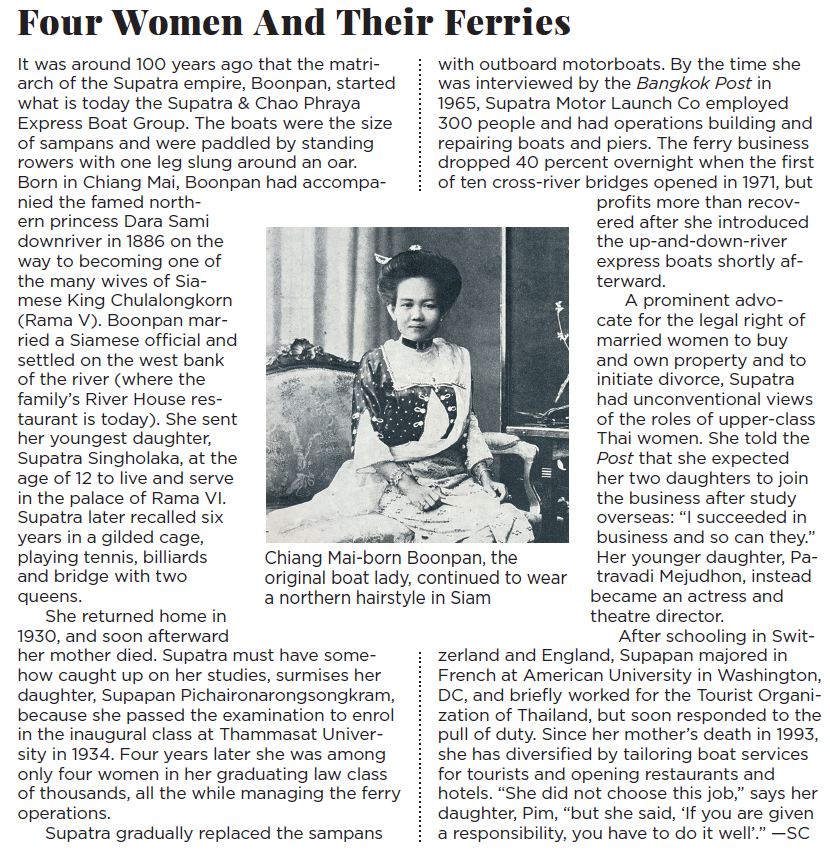
After ordering a feasibility study, Pim decided to build Tha Maharaj, a two-storey shopping mall fronted by a public park along the river. “I did my own loan package, negotiated the terms, talked to architects,” she says. Then she had to recruit 42 shops, kiosks, restaurants and a few office tenants to fill the space. Only 26 at the time, she could sometimes detect that her youth startled potential tenants: “Saying that I ran a sister company to Supatra always helped.”
During the same period, Pim also developed three projects across the river from Bangkok in Thonburi. She transformed an apartment building into the 68-room Riva Surya hotel, built the 25-room Riva Arun boutique hotel and turned a ramshackle shopping centre into the Wang Lang mini-mall last year. “After so much investment in the past few years, Supatra Real Estate is at a loss,” she says, “but the revenue is there, and it’s on par with our expectations. For every business unit we expect growth, but it’s different from business to business.” Overall, the group makes money, she says, thanks to the steady profits of the boat business.
That business is set for a makeover. Supapan plans to spend more than $20 million on the high-speed boats for her express service, which started in 1971 and accounts for most of the boat business’s revenue. To fund this ambitious upgrade, the mother-daughter pair is exploring a stock market listing, signing up a partner or both. The partner would most likely be a foreign company because experts in riverboat design are overseas. Well aware that “tourists love the wooden boats”, the two quickly offer assurances that the old boats will be switched to tourist services, such as charters, hotel shuttles or additional single-pass “hop-on, hop-off” boats.
The launch of the first lines of the Skytrain in 1999 and the MRT subway in 2004 raised expectations for comfort and speed in mass transit. Once the new fleet is deployed, moving from commuter rail to boat to air-conditioned bus should be “seamless”, says Pim. “We want high speed so that we can work against time,” explains Supapan. “People are willing to buy time. We travel much faster than buses and we are very punctual. It will change the scene completely.” What’s more, the government will allow the company to raise its fares. By the end of the year, commuters will be able to use a stored-value card on both the express boats and two subway lines.
As the modernisation progresses, Pim is becoming more immersed in the boat operations. “I didn’t sign up for the boat business,” she says, but in the past year she has waded in by managing its six charters for hire. She added online booking via the likes of TripAdvisor and tour agencies to the traditional booking channels at hotels and travel agencies. She wants to add excursions beyond Bangkok, perhaps to the seaside. “I’m making us more glamorous,” she says. She’s also persuaded her mother to switch most managerial staff from a six-day to a five-day workweek: “It had become too hard to recruit.”
The 57 Chao Phraya Express boats run like public buses, hauling over 100,000 people a month
In the first few years of her working life, says Pim, the most valuable thing she learnt from her mother was “to be straightforward. If something’s not working, I have to confront it”. In a culture that sets a premium on krengjai—deference, or reluctance to cause offence—it’s not easy to cultivate that quality. Since Supapan also allowed her “to experience my own bad decisions”, Pim learnt that quick decisions and directness save time and worry in the long run.
For her part, Supapan sees that Pim has some business skills she lacks: “I think she’s quite smart. What I admire about her is that she can negotiate. That’s an art. Business is constant negotiation and compromise. With me, I still find fault. I still argue all the time. She is calm, yet she has principles. She doesn’t say yes all the time.”
To streamline the operation, Pim is striving to outsource as much as possible—whether it’s to cleaning crews or professional managers—and form a tight team she can rely on. With boat services starting at dawn, shops closing at 10 pm and hotels open around the clock, “there are always problems” and thus text messages. She wants to reach the point where, if she and her mother are meeting potential partners in Europe or taking a vacation, as they did in Iran in May, she doesn’t feel compelled to check her phone frequently.
Supapan jokes that if Pim doesn’t have children, “our line will be extinct”. But Pim, who lives with her mother, says she feels no pressure to marry. As for the next succession, there’s no timetable, nor does Pim see a need for one. “My mom’s still very quick. She gets things done much faster than people my age. In meetings she often notices things before I do. She gets to the point. I think she gets her energy from working.”
(This story appears in the 07 December, 2018 issue of Forbes India. To visit our Archives, click here.)
Post Your Comment
